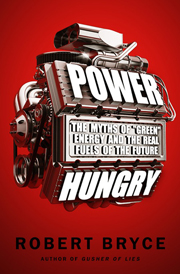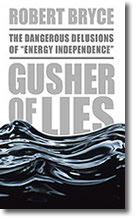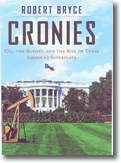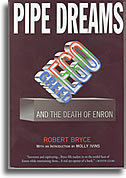 Power Hungry
Power Hungry
robertbryce.com author/journalist
Published on Robert Bryce-author/journalist (http://www.robertbryce.com)
Books
 Power Hungry
Power Hungry
In Power Hungry, Robert Bryce powerfully debunks many of the claims you have been hearing about America's energy future.
Armed with a supertanker-load of fully footnoted facts and a panoply of revealing graphics, Bryce explains why most of the hype about renewable energy and "green" technology is just that - hype. Using elementary math and basic physics, he shows why renewable sources like wind and solar are not "green" and why they cannot provide the scale of energy that the world demands. He goes on to eviscerate the notion that the US wastes huge amounts of energy. Indeed, the facts show that over the past three decades the US has been among the world's best at reducing its energy intensity, carbon intensity, and per-capita energy use.
Electric cars? Bryce explains why they are the Next Big Thing..and always will be. T. Boone Pickens? Simple math shows that the Dallas-based billionaire, and his much-ballyhooed Pickens Plan, are all hat and no cattle. Denmark as a model for being "energy smart"? Despite huge increases in wind generation capacity, the numbers show that Denmark has not reduced its coal consumption or carbon dioxide emissions. Power Hungry delivers a smart, contrarian view of what America has "in the tank," and what will be needed to transform the gargantuan global energy sector.
Gusher of Lies: The Dangerous Delusions of Energy Independence
Lately, it seems like everybody wants energy independence. George W. Bush wants it. So do Nancy Pelosi and Barack Obama. Rudy Giuliani says it's a "matter of national security." The Sierra Club and Greenpeace mention it all the time. Thomas Friedman, the Pulitzer Prize-winning columnist for the New York Times, insists the U.S. needs to build a "wall of energy independence" around itself.
 All of them are full of methane.
All of them are full of methane.
Energy independence is neither desirable nor doable. America requires too much energy, and the $5 trillion-per-year global energy business is just too interconnected for the U.S. to simply withdraw from it. Gusher of Lies shows why the U.S. must continue buying foreign energy for decades to come, including crude oil from Canada and Saudi Arabia, gasoline from Venezuela, natural gas from Trinidad, coal from Columbia, and uranium from Australia. It explains why Brazil, often held up as a shining example of ethanol's viability, is actually a classic example of the redeeming power of oil.
To read the first chapter, click here
Cronies: Oil, the Bushes, and The Rise of Texas, America's Superstate
To read an excerpt from the book, click here. Face it. Texas rules. No other province has a tighter hold on America's psyche, politics, and wallet than Texas. Two of the last three American presidents -- and three of the last eight -- have been Texans. Lyndon Johnson, George H. W. Bush and George W. Bush all got to the White House by exploiting a network of money and power that no other state can match.
 Cronies show how Texas turned its vast energy resources into political power, and how a small group of Texas corporations, lawyers and politicians use that power to protect and defend their own economic interests.
Cronies show how Texas turned its vast energy resources into political power, and how a small group of Texas corporations, lawyers and politicians use that power to protect and defend their own economic interests.
This book also:
Provides a provocative analysis of the Second Iraq War, an event that mimics actions taken by another Texas governor, who like George W. Bush, was an oilman-turned-politician. In August of 1931, Governor Ross Sterling ordered the armed invasion of several counties in East Texas, a region that contained the world's biggest oil field. Sterling's move allowed Texas to control the supply, and therefore, the price, of oil for the next four decades.
Demonstrates how George W. Bush's victory during the Florida Recount of 2000 was the quintessential example of the Lone Star State's enormous clout. To win, the younger Bush needed three things: lawyers, airplanes and money. He got all of them from Texas.
Details for the first time the central role that the Bush family's lawyer, James A. Baker III, the man who led the Bush forces during the Florida recount, has played in the Bushes' political dynasty. And it shows how he's made millions of dollars from his crony connections.
Like it or not, and many Americans don't -- Texas dominates the United States. And because of that, Texans are now running the world. This book tells how they got there, and alas, why they just might stay.
Pipe Dreams: Greed, Ego, and the Death of Enron
 Here's what reviewers said about Pipe Dreams: "Robert Bryce is a rollicking writer in classic Texas gunslinger mode -- and it would be hard to think of a style more appropriate for a tale of varmints as lowdown as the Enron gang. Bryce has a rare ability to explain complex financial concepts clearly, combined with a breezy, colloquial style that makes his story a page turner. --Salon.comPublishers Weekly magazine named Pipe Dreams one of the best nonfiction books of 2002. The magazine, the leading journal for the book business, called it a "standout." In its review, it said, "Finally, an Enron book that actually explains what happened at Enron. This isn't just the first book to make sense out of the debacle; it's a vivid cautionary tale about the consequences of the lurid excesses-personal and professional."
Here's what reviewers said about Pipe Dreams: "Robert Bryce is a rollicking writer in classic Texas gunslinger mode -- and it would be hard to think of a style more appropriate for a tale of varmints as lowdown as the Enron gang. Bryce has a rare ability to explain complex financial concepts clearly, combined with a breezy, colloquial style that makes his story a page turner. --Salon.comPublishers Weekly magazine named Pipe Dreams one of the best nonfiction books of 2002. The magazine, the leading journal for the book business, called it a "standout." In its review, it said, "Finally, an Enron book that actually explains what happened at Enron. This isn't just the first book to make sense out of the debacle; it's a vivid cautionary tale about the consequences of the lurid excesses-personal and professional."
"Bryce blends investigative reporting with a funky, freewheeling style that fills the reader in on the sordid facts of Enron while entertaining them. Greed and sex ooze from the pages as Bryce gleefully examines every lurid detail of the Enron shenanigans."
-- Boston Globe
"There are sure to be many accounts of Enron's collapse, but Bryce's gossipy version will be hard to beat for sheer readability." -- Kirkus Reviews
"a comprehensive piece of investigative journalism."
--Booklist
Read an excerpt from Pipe Dreams:
Diva of the Deal, a look at one of Enron's most aggressive profiteers, Rebecca Mark. Published in the Houston Press, October 10, 2002. Hear Robert Bryce discuss Enron on national radio:
Interview with Terry Gross on Fresh Air. Interview with Lynn Neary on Talk of the Nation about Enron and corporate governance.